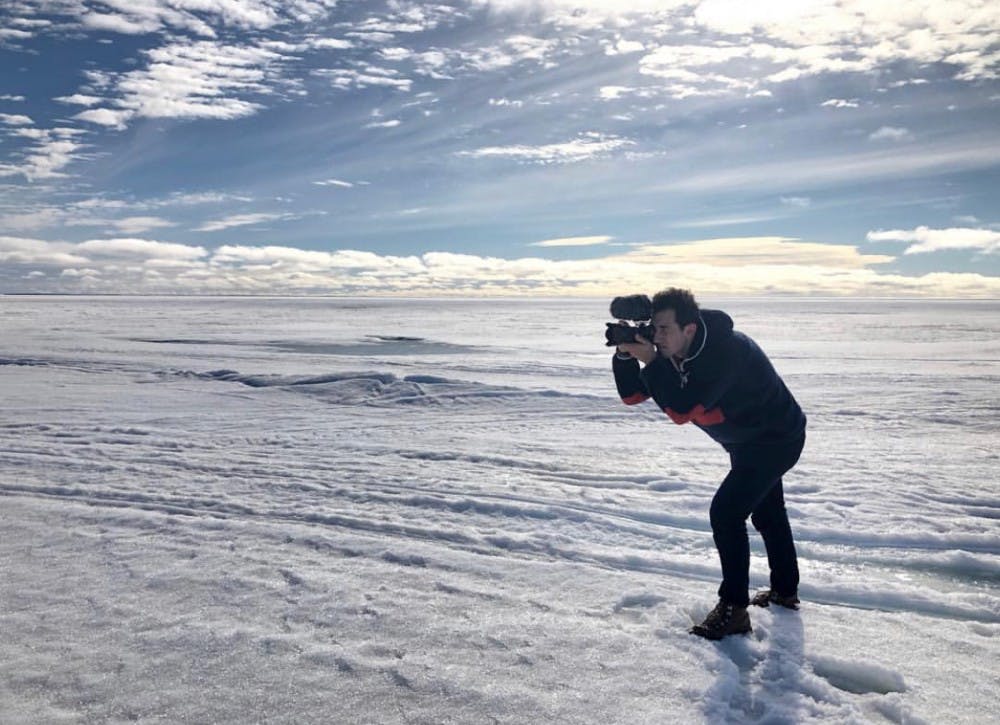What are two rising Penn seniors to do during their last summer as college students? If you’re Kyle Rosenbluth (E ‘19) and Daniel Fradin (C ‘19), you fly to the Arctic Circle with recording and production gear in tow, and you make a movie. When I sat down with the pair of housemates, friends, and newly minted partners in filmmaking, they recounted their decision to book a one way plane ticket to northern Canada and shoot a documentary about climate change in a remote town casually, with smiles on their faces.
“I think we were both coming from places where in summers past—I study computer science, and Daniel studies English—we both worked desk jobs that we weren’t in love with,” Rosenbluth says. “And we wanted to see for our last summer, before we graduate, if we could do something really fun.”

Photos provided by Daniel Fradin
Despite limited prior documentary experience, shooting a movie together seemed like a natural choice for the two friends who share love of movies. “The day we first became friends was freshman year,” Fradin said, “when I ended up in [Kyle’s] dorm room somehow. And he had a poster of the Wes Anderson movie The Life Aquatic with with Steve Zissou—one of my favorite movies.”
“I’d say a large portion of our friendship is based on a love of movies,” Rosenbluth added. In the fall of their junior years, they both studied abroad in Copenhagen, and the inspiration for the documentary was born while Fradin was taking a class there on Arctic politics—much of which centered around the impacts of climate change in the area.

Photos provided by Daniel Fradin
To film their project, Rosenbluth and Fradin traveled to a town in the far north of Canada called Tuktoyaktuk (shortened to Tuk), which lies on the Arctic Ocean’s Beaufort Sea and boasts a total population of about 950, most of whom are indigenous. Life is different in Tuk, and Fradin and Rosenbluth laugh about some of their adventures there, while recalling others fondly, like the “northern hospitality” they experienced.
“We really wanted to go there, and we didn’t want to leave until we had a story to tell,” Rosenbluth said, and they tell me several—like how twenty–four hour sunlight meant that they would look out the window at 1 a.m. to see nine–year–olds riding bicycles, or how they took offers from residents they had just recently met for places to stay and sleep.

Photos provided by Daniel Fradin
But when they told me about the issues plaguing the small town, their tones turned serious. “Tuk was being heavily affected by climate change. They were losing shoreline at a rate of up to ten feet a year—the permafrost was melting,” Fradin said.
They made it clear that residents of Tuk are suffering from the effects of climate change, but express that they want to tell their story with care and nuance. “From the beginning, we were thinking about how would this come off—us trying to portray someone else’s issue,” Rosenbluth said, and stressed the need to be careful and respectful.

Photos provided by Daniel Fradin
“They’re not as concerned about climate change as we are—they don’t have the luxury of worrying about these factors that will be affecting their lives in ten or twenty years, they need to focus on getting their next meal.” Fradin recounted a story where they asked an interviewee, “What do you think about these two white kids coming in here and making a movie about you guys?” and being struck by his response—”You guys have the camera.”
The two have a clear passion, both for this project and film in general, and have lots of ideas for their next steps. Currently, they’re in the process of editing down their project from this summer, and hope to showcase it at film festivals and do a screening at Penn once it’s completed.

Photos provided by Daniel Fradin
When I ask them if they’ll collaborate again in the future, they both treat it as a given—but throughout the conversation, they also express how grateful they are to have been able to make this first one. “It was my first proper attempt at making a movie,” Rosenbluth said. “But since high school, I think, I had always dreamed about movies, but never thought I’d actually make one.”
“You do need a few people to make a movie,” Fradin mentioned towards the end. “It was always hard for me to make movies at Penn because I couldn’t find other people who wanted to make movies with me...you need to find a team." Looking over at Rosenbluth, he added: “And luckily, Kyle and I can work together.”







